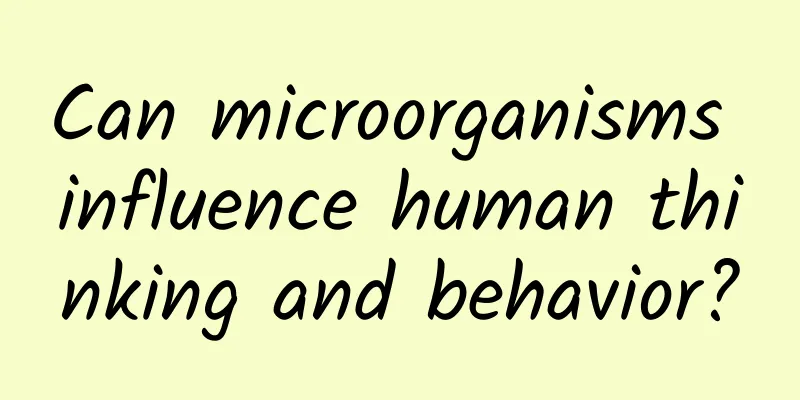Can microorganisms influence human thinking and behavior?

|
When it comes to microorganisms, many people have a bad impression that microorganisms are harmful. This is normal. After all, infectious diseases are caused by microorganisms, so we have been taught to be clean and stay away from microorganisms since childhood. However, living in an environment where microorganisms are everywhere, humans have long learned to live in harmony with many microorganisms. So, some people raised the question, since microorganisms are everywhere, are there any microorganisms that can affect human thinking and behavior? Let's talk about this today. 01. How to define the impact on people’s thinking and behavior? In fact, it is difficult to define the influence on people’s thinking and behavior. For example, if you have a cold and feel drowsy, is it considered an influence? If you insist on finding a microorganism that can control the human brain, then you overestimate microorganisms and underestimate humans. Even the "zombie ants" mentioned by some netizens are just the instinct of a microorganism, and they do not intentionally control organisms. In this case, they just treat the host as a "large culture medium." From this perspective, almost all microorganisms and viruses have this characteristic. Of course, I think the most suitable one is HIV, which directly destroys human immunity and turns you into a culture medium for various microorganisms. 02. Viruses that have a greater impact on humans First, the rabies virus invades the central nervous system, eventually causing the patient to suffer from auditory hallucinations, mental disorder, fear of water and wind, etc. This is a relatively strong virus that acts directly on the nerves. Once the disease occurs, it cannot be treated. The second type is prions. Actually, this is more complicated because there are still problems in the academic community to define it. Whether prions are viruses or life is controversial. It may be a great existence, that is, an intermediate between non-living things and living things! However, prions can indeed infect the human central nervous system and then cause neurodegenerative diseases in people. In the end, people are like patients with Alzheimer's disease, but they die soon. Moreover, this virus can be transmitted across species. For example, mad cow disease and sheep scrapie are caused by this thing. It is difficult to judge the damage to thinking and behavior. For example, if one has a stomach problem and feels listless, does that count as being affected? There is also a virus called polio virus, which is an acute virus that causes permanent damage. It mainly invades the motor nerve cells of the central nervous system. The polio that everyone sees is caused by this virus. Although this virus may not be fatal, it will directly damage the subcutaneous fat, and the tendons and bones will also atrophy, leading to limb disability. The vast majority of limb disabilities we see are caused by this virus, but the current popularity of vaccines has greatly reduced the incidence rate (oral sugar pills). The above viruses are all very severe. Here are some of the more common viruses. 1. Influenza virus - this virus mainly causes colds, but some viruses can be fatal (a large family). I believe everyone knows that you will feel dizzy and have a headache after having a cold. 2. Herpes zoster - commonly known as herpes zoster, is an acute infectious skin disease caused by the varicella-zoster virus. It is a neurotropic virus that can remain dormant in the neurons of the dorsal root ganglia of the spinal cord for a long time after infection. When the body's resistance is low or when the person is tired, infected, or has a cold, the virus can grow and reproduce again and move along the nerve fibers to the skin. 3. AIDS - caused by the human immunodeficiency virus (HIV). The power of this virus lies in its ability to break through the human immune system. In the end, you have no immunity, and all bacteria and viruses can survive in your body. You become a large culture medium and eventually die from various complications. Currently, there is basically no cure. For the sake of personal health, please resolutely avoid unclean sexual behavior. 03. Helicobacter pylori Helicobacter pylori - gastritis. The most revolutionary event in the 21st century, which overturned people's previous understanding of gastric disease (stomach pain is caused by irritating food, excessive stomach acid or excessive stress) won the 2005 Nobel Prize. (This Nobel Prize is also a subversive one in recent years. Contrary to the past practice of scientific research giants winning the Nobel Prize, these winners are not scientists, but ordinary doctors, and have not published any major articles, so they are highly praised. I personally think this is the meaning of the Nobel Prize, just like Tu Youyou, who may not have published any major articles, but has made huge contributions to mankind) |
>>: If a bug lands on you, don’t slap it away casually, as it can be fatal!
Recommend
Robots can spin pens and roll walnuts! GPT-4 helps robots perform better with more complex tasks
Dear friends, after artificial intelligence (AI) ...
The epidemic is not over yet, why do scientists want to "make trouble" by reviving ancient viruses?
Audit expert: Gu Haitong Beijing Tongren Hospital...
Was chocolate originally a drink? And you had to add chili to it!!
Do you remember the feeling of eating chocolate f...
Facebook AI Director: Deep Learning Technology Trend Report
New Wisdom Original 1 Source: Yann LeCun Compiled...
Alipay's "Five Blessings" campaign is officially launched! Come and share 500 million yuan
At midnight on February 1st, the 2021 Alipay Five...
The methodology for 10x user growth is all here (10,000 words of dry goods)
How to solve the user churn problem using growth ...
Information flow advertising material placement ranking competition, if you cooperate well, you will win!
A tank. I play jungle. Team fight in the middle l...
Why is Tik Tok rebelling against Tencent?
Toutiao and Tencent have recently started a fight...
Android Chronicles (14): Android 2.3 Gingerbread — The first major UI change
Android 2.3 Gingerbread - The first major UI chan...
It’s the end of the year, and we need to compete with event creativity again? Here is a thinking tool for you
At the end of the year, Christmas , New Year'...
Small fishing village? Metropolis? 70 pictures to help you explore Hong Kong's hidden secrets
When you stand on the streets of Hong Kong Will f...
I finally saw the loon I had always dreamed of, but...
Not long ago, I heard that a red-throated loon ha...
Konka HD player HAN330 review: Genuine content brings excellent user experience
Smart TVs and TV box products that provide online...
It disappeared for 40 years and was named "extinct", but it recently reappeared!
In the past two weeks, we have collected these fr...
Visiting the set of "Lip Sync Battle" to see how small but exquisite variety shows break through
At the beginning of 2016, amidst the bombardment ...









